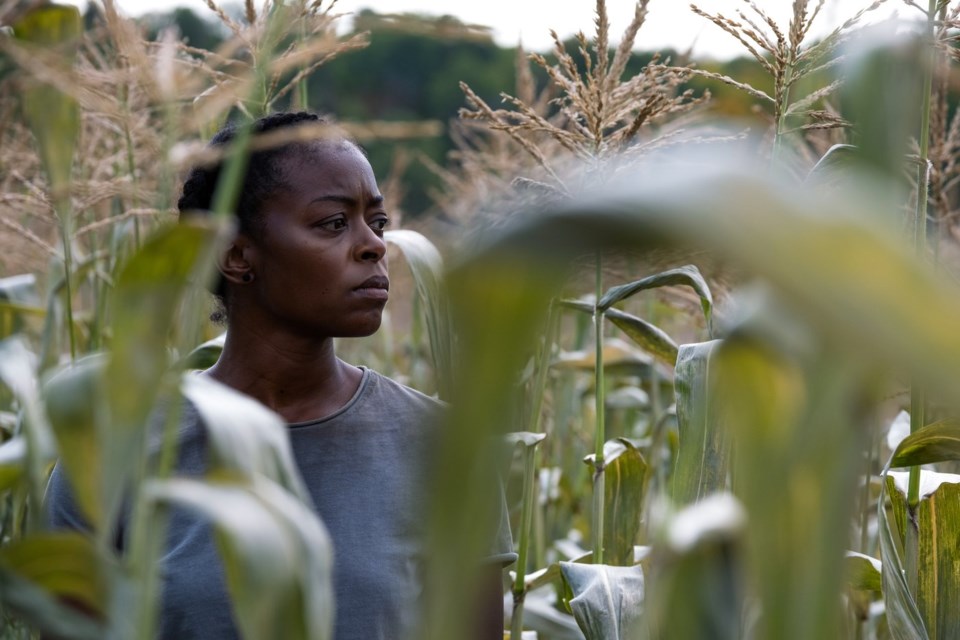TORONTO ‚ÄĒ R.T. Thorne says he could have played it safe with his debut feature. Instead, he swung for the fences, writing an epic sci-fi thriller about generational trauma, cannibalism and humanity‚Äôs connection with land ‚ÄĒ all set in what he calls ‚Äúa post-apocalyptic world where the stakes are at the absolute highest.‚ÄĚ
‚ÄúFor my first film, it was incredibly ambitious and probably really stupid to write something like that,‚ÄĚ the Calgary-born writer-director laughs in a recent video call from Toronto.
"40 Acres,‚ÄĚ out Friday, centres on a Black-Indigenous family in a famine-stricken future where a fungal pandemic has wiped out all animal life on the planet.
When a marauding group of cannibals closes in on their farm, ex-military matriarch Hailey Freeman, played by Danielle Deadwyler, clashes with her son Manny, played by Toronto’s Kataem O'Connor, over the best way to survive a world in ruins.
Deadwyler says she was drawn to the film‚Äôs historical context ‚ÄĒ the Freemans are the last descendants of a Black family of farmers who settled in Canada after the U.S. Civil War.
‚ÄúThe connection between the American and Canadian history of folks getting to this northern liberated land, it was very much on my mind,‚ÄĚ the Atlanta native says in a recent video call Los Angeles.
‚ÄúYou can talk about the Underground Railroad for sure ‚ÄĒ there were people escaping who got (to Canada) and established themselves. When we think about Hailey, she is coming from a place where she understands the century-plus-long history of her family on the land that they are fighting for.‚ÄĚ
Michael Greyeyes, who plays Hailey‚Äôs partner Galen, considers ‚Äú40 Acres‚ÄĚ an ‚ÄúIndigenous rights film‚ÄĚ because it centres on people fighting to stay on their land.
‚ÄúIf you look at the world in general, colonialism, empire and taking land away from Indigenous populations is an ongoing threat,‚ÄĚ says the actor from Muskeg Lake Cree Nation in Saskatchewan, reached by Zoom in Winnipeg.
‚ÄúOur film actually states that the land belongs to the caretakers and that we resist empire and we resist encroachment.‚ÄĚ
Thorne says the earliest seeds of the film were planted in something more intimate: a desire to channel his relationship with his mother.
‚ÄúShe ran a strict household. I grew up with somebody who was so concerned and so vital in teaching me how to move in the world and what she felt was important in the world,‚ÄĚ he recalls.
Thorne got his start directing music videos for artists including Sean Paul and Keshia Chant√© before creating the 2020 sci-fi series ‚ÄúUtopia Falls‚ÄĚ and helming the 2022 period drama ‚ÄúThe Porter,‚ÄĚ both of which aired on CBC.
With ‚Äú40 Acres,‚ÄĚ he set out to explore ‚Äúthe universal generational conflict that happens in every family: the parents think they know what it is and as the young people grow up, they want freedom.‚ÄĚ
But as a self-described ‚Äúdreamer,‚ÄĚ his ambitions quickly grew, envisioning a do-or-die sci-fi future where that family tension could play out on a much larger canvas.
Originally conceived seven years ago as a microbudget project through Telefilm’s Talent to Watch program, the Sudbury, Ont.-shot film expanded in scale and scope to match Thorne’s creative vision.
There were some growing pains. Just after the film’s premiere at the Toronto International Film Festival last September, the union representing crew members on the shoot issued a statement saying they were "profoundly disappointed" that some crew and vendors had yet to be fully paid for their work on the production.
IATSE ‚ÄĒ which represents behind-the-scenes workers across film, TV and theatre ‚ÄĒ says all outstanding payments have since been made.
At a public event in Toronto last week, ‚Äú40 Acres‚ÄĚ producer Jennifer Holness addressed the situation by saying that just before filming began in fall 2023, a U.S. distributor that promised a minimum guarantee asked for script changes that would have ‚Äúdamaged the film and our vision.‚ÄĚ
Holness said the team chose to walk away, leaving the production "$2 million in the hole."
With an initial $8 million budget ‚ÄĒ including $3.2 million in public funding from Telefilm ‚ÄĒ Holness said the production became a week-to-week financial struggle.
‚ÄúEvery single week after the third week of production, we were in a situation of, ‚ÄėHow do we get to the end of the week and pay everyone?‚Äô‚ÄĚ she said.
‚ÄúWe did 12 weeks up there, and we paid our crew every single week on time. We, the producers, had to come together and invest in the film ourselves. It was a journey. It was an incredibly stressful journey.‚ÄĚ
The film was picked up by U.S. distributor Magnolia earlier this year and heads to screens across North America this week.
Thorne says all payment issues have been resolved and commends Holness for ‚Äústeadying the ship.‚ÄĚ He adds there are many issues that occur during productions that people don‚Äôt know about.
‚ÄúYou're always almost falling over to get it to the screen. The thing that I will say is that you come together as a community and you try to fix the mistakes and issues that you have and you make sure that people feel taken care of,‚ÄĚ he says.
‚ÄúAnd then you come out successful at the end when you do it. And the films that don't, you don't hear about them.‚ÄĚ
This report by The Canadian Press was first published July 3, 2025.
Alex Nino Gheciu, The Canadian Press



